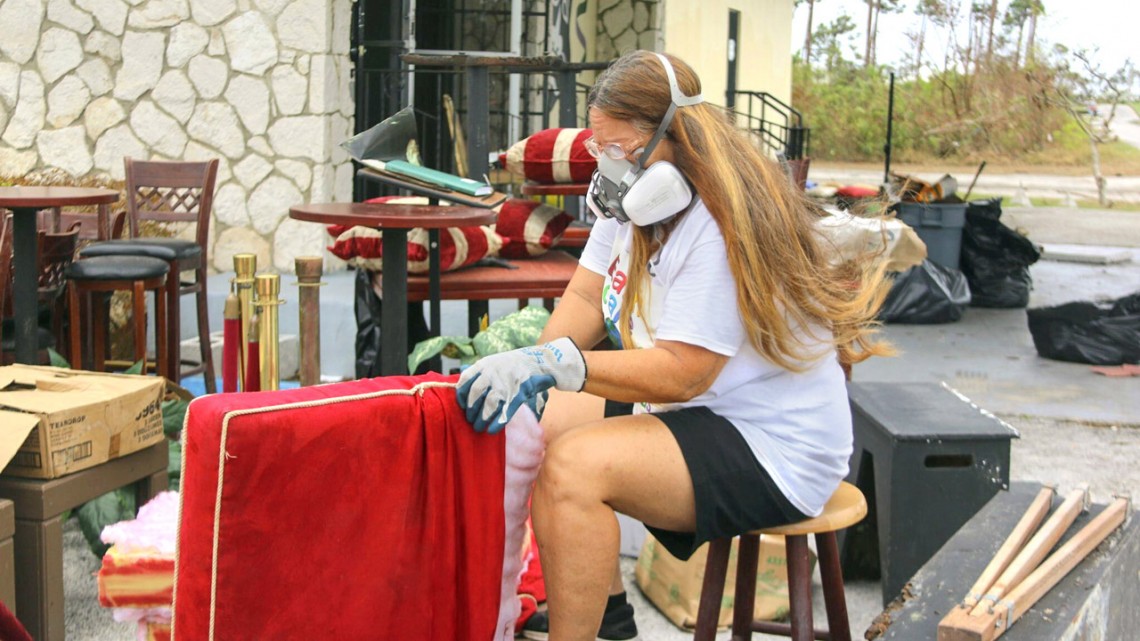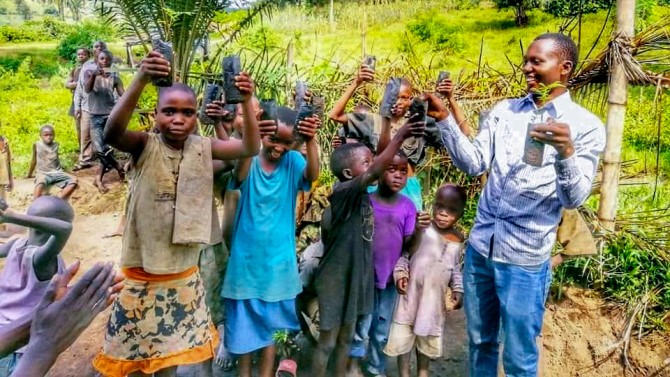
Gail Woon, founder of Earthcare in the Bahamas, cleans up in the aftermath of the category 5 Hurricane Dorian, which hit her home island Grand Bahama directly on Sept. 1.
Around the world, Cornell fellows guide climate action
By Blaine Friedlander
Social activist Emmanuel Niyoyabikoze, founder of the Greening Burundi Project, aims to plant 1 million trees in the African Republic of Burundi, which has suffered from extensive deforestation over the past 30 years.
Niyoyabikoze is one of approximately 70 professionals from around the world – academics, business people, social activists and others – who for the past year have battled atmospheric greenhouse gas by taking action locally and persuading those in their social networks to join in.
“People all over the world want to do something about the climate crisis,” said Marianne Krasny, professor of natural resources in the College of Agriculture and Life Sciences, and director of the Civic Ecology Lab. “All of us have social networks and maybe we can influence those networks to take positive action on climate change.”
With that in mind, Krasny last year organized the Cornell Climate Online Fellows, based in the Department of Natural Resources. More than 1,200 international professionals from about 25 countries applied to participate as members of the spring 2019 and fall 2019 cohorts. About 35 individuals per semester were selected. The fellows participate in weekly conference calls and lectures; read articles on social influence; communicate via email; post on Facebook; and chat via WhatsApp.
This spring, Krasny will be offering a massive open online course, or MOOC, version of the fellowship, “Climate Action: Scaling Up Your Impact,” starting April 4. Registration and course description will be posted Feb. 25 at the Civic Ecology Lab website.
Fellows in the first two cohorts of this program took climate mitigation seriously, as all face the reality of a warming globe.
Niyoyabikoze joined the Cornell Climate Online Fellows for the fall 2019 cohort.
In 1990, half of Burundi – in southeastern Africa – was covered in trees; today, it’s only 5% to 10%. Its citizens live on maize, beans and tubers grown on small farms, with yields hampered by intense soil erosion and climate change.
“Our vision is to reforest Burundi and make our world free of climate crisis,” said Niyoyabikoze, whose group works with children, teens and young adults to plant trees. The Greening Burundi Project has set up environmental clubs in the country’s schools.
Last year, the Greening Burundi Project planted 40,000 seedling trees. The group is a long way from its goal, and Niyoyabikoze – whose social network are the participants of the Greening Burundi – said environmental education for children and teens is key.
“We often focus on young people,” he said, “to inspire them to take care of our planet.”
Other examples of fellows’ work:
- Sharin Naomi, professor at the Asian University for Women, and who lives in Bangladesh, chose as her social network women throughout central and southeast Asia attending her university, and worked with them to adopt a plant-rich diet.
- Avinash Acharya, a management professional from Bangalore, India, organized “Climate Save November” – a campaign to reduce the carbon footprint among 25 of his friends. They reduced food waste, ate locally, used mass transportation, walked and avoided using energy for food delivery.
- Fatima Delgado, a doctoral student from Ecuador, living in Barcelona, convinced local grocery stores to support plant-rich diets. She started the “Sustainable Tapas” brunches among her friends in an effort to change unsustainable eating habits. In three months, her climate-change social network grew to 34 participants, three events and 157 members.
“This is a unique experience for in-depth training and discussions with Cornell faculty and climate-concerned citizens from around the world,” Krasny said.
Marine biologist Gail Woon, founder of Earthcare in the Bahamas, finished the spring 2019 cohort last May, all while working to educate children and consumers on the benefits of LED lighting. But late last summer, Woon witnessed real devastation from the warming ocean, as it fed massive Hurricane Dorian. On Sept. 1, the Category 5 storm hit Grand Bahama Island.
Inside the whirlwind, Woon told the climate fellows on social media how the harrowing events and water surges unfolded. The Washington Post quoted Woon in three separate articles, even as the roof on the church shelter where Woon and others took refuge collapsed.
The Cornell fellows – through WhatsApp – kept tabs on Woon’s 40-hour ordeal.
“I am still living it,” she said. “I still cry … for my friends who did not survive this horrific climate-changed Hurricane Dorian. We must adapt, be resilient and drawdown this climate crisis. Try hard to convince government and company leaders that they have an important responsibility to listen to the youth and hold politicians to [task] on the climate crisis. We are living and dying proof of the climate crisis.”
Media Contact
Get Cornell news delivered right to your inbox.
Subscribe

